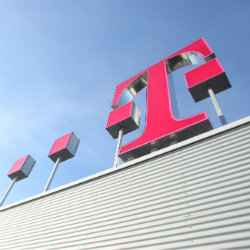DT Quits Web Hosting With €600M Strato Sale
German incumbent sells its Strato web hosting business to broadband rival and wholesale customer United Internet.

Deutsche Telekom has agreed to sell its Strato web-hosting business to broadband rival United Internet in a €600 million (US$629 million) cash deal.
The sale comes weeks after the German incumbent dropped out of bidding for Host Europe plc , a bigger web-hosting company, after reportedly deciding the valuation of that business was too high and that integrating it with Strato would be difficult.
Having given up on Host Europe, which was eventually acquired by US-based GoDaddy.com Inc. for $1.8 billion, Deutsche Telekom AG (NYSE: DT) appears to be quitting the web-hosting game entirely.
Expansion into other parts of the cloud services market remains a priority, however, and the operator could always use proceeds from the sale, which is fetching more than 12 times what Strato makes in annual earnings, to buy or fortify other cloud assets.
In a statement about the deal, Deutsche Telekom said the Strato divestment was in line with its strategy of "consider[ing] options for increasing the value of business areas that can no longer be adequately developed within the Deutsche Telekom Group, through partnerships or disposals."
United Internet AG , which uses Deutsche Telekom's networks to provide broadband services, sees the Strato takeover as a way of bolstering its own hosting capabilities.
"The acquisition of Strato will enable us to expand our leading market position in the European hosting and cloud application business and drive the consolidation of a market which is currently still strongly fragmented," said Ralph Dommermuth, United Internet's CEO, in a company statement.
United Internet has also provided an assurance that Strato will continue to host Deutsche Telekom own MagentaCLOUD services in the coming years. "Nothing will change for Deutsche Telekom's customers," said the incumbent.
Deutsche Telekom bought Strato for a fee of €275 million ($287 million) in 2009 and it today employs about 500 people in Germany and the Netherlands and has around 2 million customer contracts. In the last five years, annual sales have risen from about €90 million ($94 million) to an estimated €127 million ($133 million), with EBITDA growing from €30 million ($38 million) to an estimated €48.5 million ($51 million) over the same period.
The takeover will also come with two high-performance data centers that Strato maintains in Berlin and Karlsruhe.
Want to know more about cloud services? Check out our dedicated cloud services content channel here on Light Reading.
The acquisition is to be made through a holding structure that United Internet is setting up with private equity firm Warburg Pincus, which bought a third of the broadband player's web-hosting business in a €450 million ($472 million) deal last month.
United Internet says it will draw on a €350 million ($367 million) loan and equity capital from Warburg to make an initial payment of €566 million ($594 million) to Deutsche Telekom in the first half of 2017, when it expects the deal to close. Another payment of €34 million ($36 million) will follow, subject to "certain performance goals."
The company reported revenues of about €2.9 billion ($3 billion) for the first nine months of 2016 -- 6.4% more than in the year-earlier period -- and saw EBITDA rise by 13.4%, to about €613 million ($643 million).
Shares in United Internet were trading up more than 4% in Frankfurt at the time of publication, while those in Deutsche Telekom had risen about 0.5%.
— Iain Morris, 

 , News Editor, Light Reading
, News Editor, Light Reading
Read more about:
EuropeAbout the Author(s)
You May Also Like












